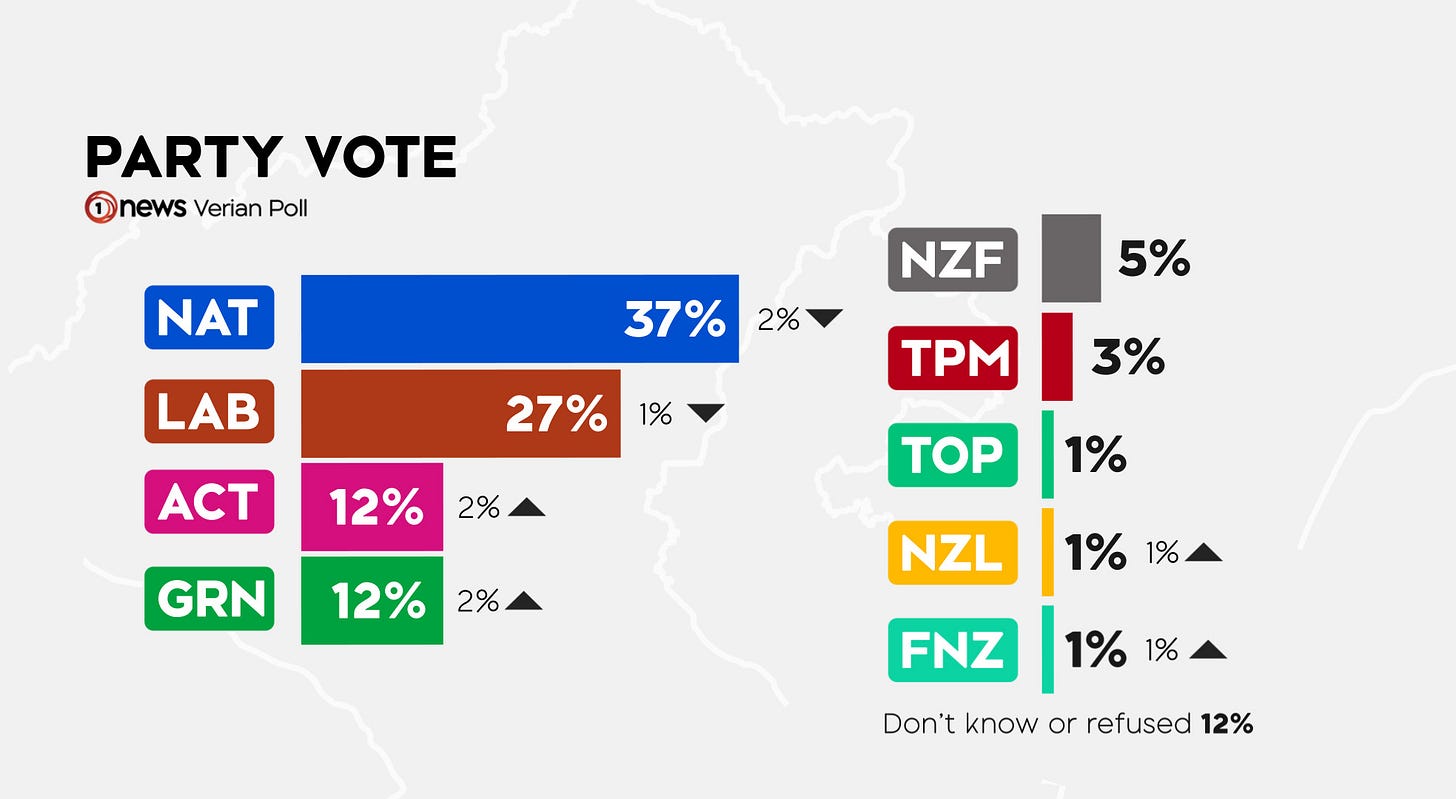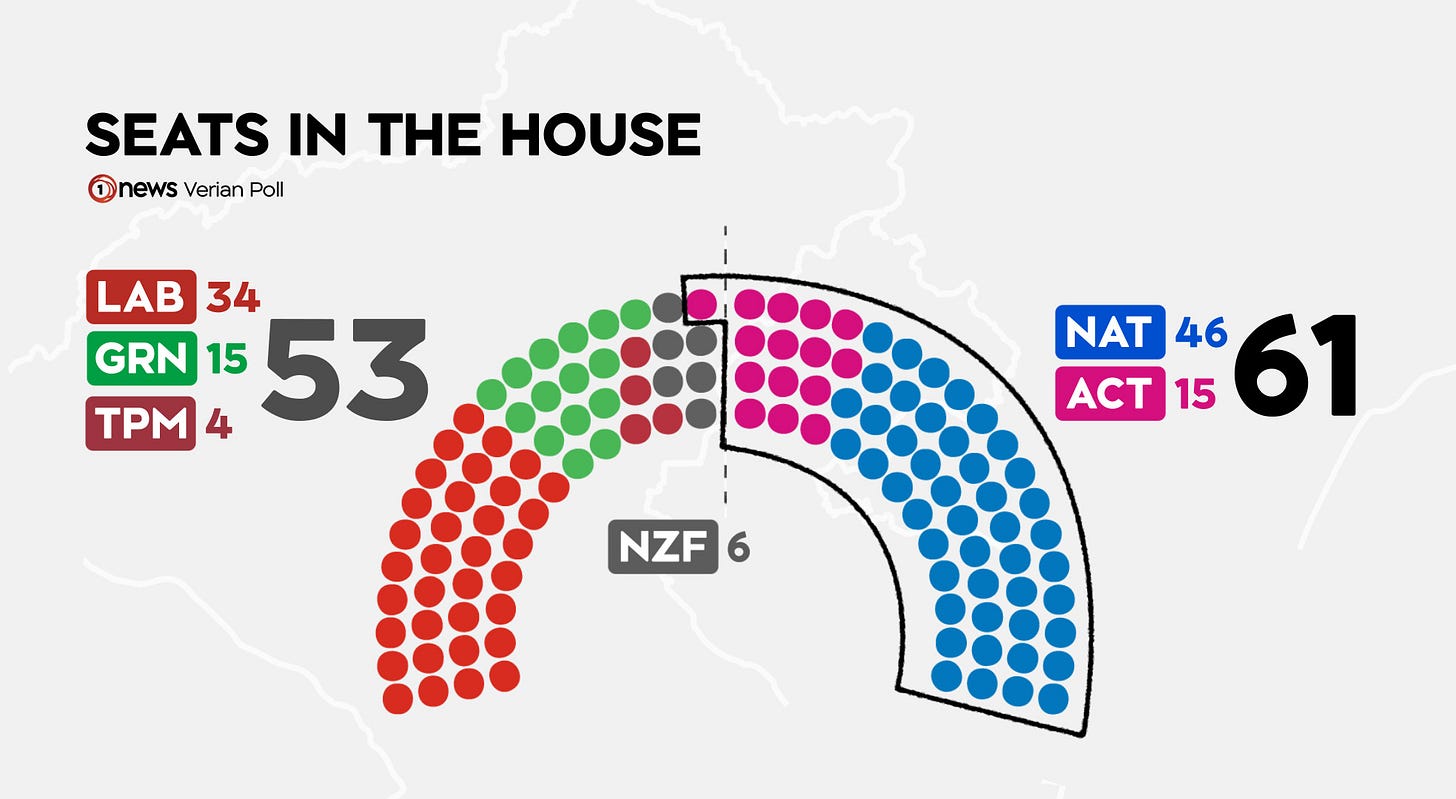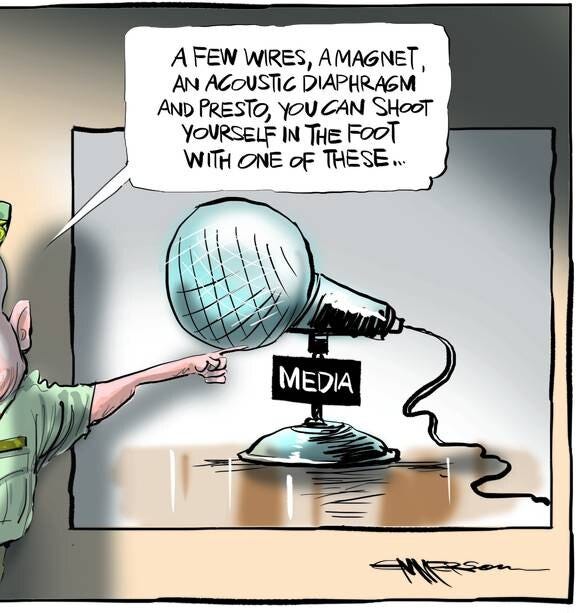On 21 September I wrote a personal analysis of political polls and how the mainstream media in Aotearoa New Zealand were (misre-)presenting that information to the public:
“Aside from the barely mentioned fact that 12% remain Undecided or Refuse To Say who they would vote for, this poll ignores the elephant in the room: Special Votes.
The casting of Special Votes - many from Kiwis travelling overseas - plays a crucial part in the final, post-election make-up of Parliament. This often deterrmines which Bloc wins sufficient seats to govern.
And without fail, Special Votes always favour the Left, stripping National of one or two seats after counting has determined final Parliamentary seating allocations.
But you wouldn’t know any of this listening to the well-paid, supposedly authoritative political commentators on TV1, TV3, RNZ, NewstalkZB, et al. Not one has ever referred to the all-important issue of Special Votes: not one.
Think about that for a moment.
It effectively renders every single political poll a waste of time. Presenting polling results, without adding the Special Votes factor, give us only a partial insight as to how Parliament might look after a general election. In 2014, the Special Votes denied National a historic overall majority - a feat Labour would enjoy six years later during a global crisis.”
In every election held in 2008, 2011, 2014, 2017, and 2020, National lost seats to Labour and/or Greens and/or Te Pāti Māori.
Yet, whenever polls were presented in the media, the results were invariably translated to seats in Parliament in absolute terms, without nuance. From raw percentages:
… to seat allocations:
Special Votes seemed to be studiously ignored. Yet, it would be Special Votes that would often be a crucial deciding factor in how our governments were formed post-election.
On 21 September, I wrote:
“For example, take the most recent [20 September 2023] TV1 poll :
National: 46 seats
Labour: 34 seats
Greens: 15 seats
ACT: 15 seats
NZ First: 6 seats
Te Pāti Māori: 4 seats
Now factor in Special votes. (Labour/greens/TPM are lumped together, as are National and ACT, as it is unclear which Party will benefit from re-distributed seat allocation.)
Re-distribute two seats as in 2020 and 2017, and the result takes on a dramatic turn:
National/ACT: 59 seats
Labour/Greens/TPM: 55 seats
NZ First: 6 seats
National and ACT no longer have an outright majority.
The Left Bloc is also six seats short.
Which leaves the Winston Peters Party as King Maker. That’s the real story of this election.”
After Special votes were counted and released on 3 November, the Electoral Commission announced Parliamentary seat allocations:
National/ACT: 59 seats
Labour/Greens/TPM: 55 seats
NZ First: 8 seats
Except for the results for NZ First, my assessment of seats won by the Right Bloc (59) versus Left Bloc (55) - was spot on. (I should have placed a bet at the TAB!)
If TVNZ, TV3/Newshub, NewstalkZB/NZME, et all, had followed the same simple process, their interpretation of polling results might have been closer to reality.
Instead, we had media pundits apparently discovering Special Votes for the first time on Election Night. Some of their “commentary” could best be described as naive; at worst woefully lazy thinking. "Better late than never" doesn't seem applicable in this situation.
RNZ’s Deputy Political Editor, Craig McCulloch, wrote on 3 November:
“It took 20 days to recount all the ballots - to add in those so-called special votes, to check for mistakes or fraud - finally delivering a bombshell.”
Aside from the fact that Special Votes are not “so called” - the Electoral Commission and Electoral Act 1993 specifically refer to Special Votes - the results could hardly be described as a “bombshell”. Special votes have been an important factor in our Elections since at least 2008 (if not earlier).
Apparently, so-called Deputy Political Editor, Mr McCulloch was unaware of these things.
On 2 November, TVNZ published analysis by election analyst, Adrian Beaumont, pointing out how Special Votes result in National losing one or two seats, and how this impacts on the final make-up of Parliament. Sadly, this analysis was never presented to TVNZ’s audience whenever it published polling results throughout the year.
During the drama of Election Night on 14 October, TVNZ’s political editor, Jessica Mutch-McKay - perhaps dawning on her that she and her media colleagues had stuffed up the relevance of Specials - dismissively called into question whether Special Votes this time would favour the Left. She cited unsubstantiated “dissatisfaction” with closure of our borders during the covid crisis as possibly alienating traditional Special Vote support for the Left.
Almost three weeks later, on 3 November, during a “Q+A with Jack Tame Election Results” Special, Ms Mutch-McKay stated blithely (at 3:52):
“I think it was really hard to tell because going into it usually Special Votes go to the Left. There were 80,000 people living overseas and some commentators said that because those people living overseas were perhaps feeling frustrated with Labour about being locked out with covid, that those would go to the Right…”
Ms Mutch-McKay apparently forgot that she was one of those un-named ‘some commentators’.
After a year of media political pundits breathlessly reporting each political poll - without even once referring to the all important Special Votes factor - those very same “pundits” first tried to dismiss the importance of Specials; then, belatedly, tried to make sense of them, calling them a “bombshell”.
How they could be a “bombshell” when Special Votes have been a constant with MMP elections is unclear. Perhaps they were a "bombshell" to media pundits?
Political polling also fails to offer us a clear understanding of the public mood at another level. On 22 September, a reader of my blogpost, Andrew Riddell, made this astute observation:
“Another polling question that misleads is the one about whether the country is heading in the right direction or not.
Aside from the questionable practice of at least one pollster whose question refers to 'on the right track' the main fault with the question is the lack of a follow up to clarify what the 'right' direction would be.
So you get a result which says that, for example x% say the country under this government is heading in the wrong direction, but this answer does not differentiate between those wanting a right wing direction and those wanting a more left wing direction.”
Mr Riddell is on point. At no time has any political poll ever explained to the audience what constituted the “right” or “wrong” track. Except for cheap clickbait value, the question is rendered meaningless.
What we have gleaned from political polling is that crucial factors (Special Votes) are omitted and pertinent questions (right/wrong track) are so vague as to be useless.
The fact that an unpaid blogger, writing in his spare time, with my beloved partner offering her proofreading services, could better pick an election result in contrast to tens (hundreds?) of thousand of dollars spent on polling companies by mainstream media - brings a wry smile to my lips.
On a more serious note, we are poorly served by media political reporting in this country. But even worse than simplistic political polls being misleading - they may influence tactical voting. Voting outcomes based on misleading polls cannot be good for our democracy.
Writing for The Post on 31 October, former ACT MP, Heather Roy, advocated that political polling should be banned once voting begins. She said:
“Some experts argue the ability of independent organisations to conduct and report the results of polls, free from government interference, is emblematic of a free and fair society. I agree in principle, but we should also ask ourselves the question, when do political polls stop reflecting public opinion and begin shaping it?”
It is not often I agree with ACT MPs, former or current, but on this issue I believe Ms Roy has made a fair point.
Especially when media are not giving us accurate analysis from their very-expensive polls.
It took several years for polling companies to catch up with the fact that more and more people were reliant solely on cellphones. Phoning respondents (members of the public being polled for their opinions) solely on landlines was skewing results by not fairly representing students, low income families, and other transient people for whom cellphones were their only means of communication.
On 12 December 2013, I reported that Census NZ statistics showed a considerable swing away from landlines in Kiwi households:
“…only “85.5% of households had access to a landline telephone at home, down from 91.6% in 2006”. This means that 14.5% of households did not have access to a landline”.
Polling companies eventually caught up with the inexorable march of technology. They began calling cellphones, as well as landlines.
It is time polling companies and the media caught up with Special Votes and more specific, nuanced, questions. MMP has been with us since 1996. Shouldn't twenty seven years have been sufficient?
.
References
Stuff media: National loses majority, Greens pick up one
TVNZ: Poll - National, ACT, retain slender advantage in path to power
Electoral Commission: Official results for the 2023 General Election
RNZ: Peters' stock rises on final vote count, how much will Luxon pay?
NZ Legislation: Electoral Act 1993
TVNZ: Analysis - Special votes mean National, ACT will likely lose majority
Youtube: National needs NZ First to form government, special votes revealed - 1News Your Vote 2023
Frankly Speaking: Andrew Riddell - 22 September 2023
The Post: Polls should be banned during the election voting period
Additional
RNZ: How Christopher Luxon’s NZ First gamble failed
Stuff media: Phone calls, ignored texts and timelines - The clues that reveal how tough Christopher Luxon has it
Other Blogs
Nick's Kōrero: Kiwis Reject Austerity!
Previous related blogposts
Census, Surveys, and Cellphones (8 March 2013)
Dodgy polls, dodgy dealings, and a spot of fear-mongering (26 June 2013)
Mr Morgan phoned (1 September 2013)
Census, Surveys, and Cellphones - Part rua (12 December 2013)
TV3 News on Polling Cellphone Users – Only A Year Late (13 July 2014)
The Votes That Media Dare Not Speak Its Name (21 September 2023)
Acknowledgement: Rod Emmerson
.
Liked what you read? Feel free to share.
Have your own thoughts? Leave a comment. (Trolls need not bother.)
.
= fs =







It's also the lack of nuance that gets me with political journalism, let alone the lack of basic research being undertaken (tax plan anyone?). The classic example was at Seymour's stand-up post the final results. He had to drop his line about "reaching out" to NZ First TWICE before a dim bulb lit up and asked "did they reply?". "No" said Seymour, pulling a face like a disappointed primary school teacher faced with years of these sluggards ahead of them.
You nailed it. Well said.